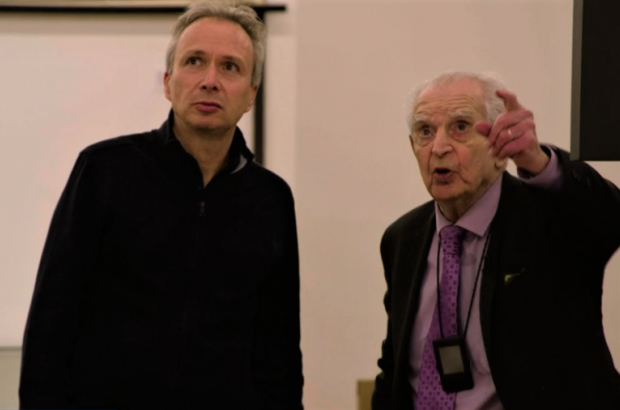- Daily & Weekly newsletters
- Buy & download The Bulletin
- Comment on our articles
Brussels survivor of Auschwitz shares memories on anniversary of liberation
In honour of the 75th anniversary of the liberation of the Auschwitz-Birkenau concentration camps on Monday, survivor Alberto Israël, who lives in Brussels, visited the Kazerne Dossin holocaust museum. At the weekend, he explored the Mechelen museum’s many installations with a reporter from VRT and talked about his experiences at the notorious death camp.
Israël (pictured right) was 17 when he was forced from his native Greek island of Rhodos to Athens, where he and his father and brothers were put on a cattle car. Two weeks later, they arrived at Auschwitz-Birkenau.
While Israël and his brothers were selected to work in the camp, his father was not, and Israël never saw him again. “He hugged me and sent me to stand with my brothers. He knew what was going to happen. By 14.00, there were no Jews anymore; they were ash.”
Israël saw a cousin of his arrive the camp. “He was about 80 or 90 kilograms,” he said. “He collapsed, he couldn’t move anymore. The SS officer came and yelled at him ‘Damned pig Jew, get up!’ He came closer by and kicked him out of the train car, and he just fell out, like a sack of potatoes. His head hit the ground, and he died immediately.”
Rail cars made regular stop in Birkenau. “You knew that if the train stopped and they began to take people out, that they had made a selection of workers. But if the train continued to the end of the camp, there was no selection. They would all go to the gas chamber. All of them.”
Acquaintances all around
He describe the large-scale gas chambers and how victims could see people ahead of them falling as the gas got closer to them. “Mothers standing there with their children, knowing it was coming. There’s nothing in the world worse than that.”
There were many Jews from Rhodos at Birkenau, so Israël saw many people he knew die. “We were working on the railroad, digging with shovels. I was working near a friend of mine from school. He stopped for a few seconds and leaned on his shovel to catch his breath. The SS was there telling him he was sabatoging the work, asking him why he stopped. He started hitting him. My friend kept asking ‘why are you hitting me, why?’”
The SS officer became furious, remembers Israël. “Why?! You ask an SS officer why?! You’ll pay for that. He pulled his weapon and shot him dead. I just kept on working.”
After the war, Israël settled in Brussels. He has in the past acted as a witness, speaking to secondary school students in various countries, including France and Italy. He tells them to “be careful,” with radical groups, he says, “to be alert to anything that seems suspicious. Stay democratic. I tell them that so that this will never repeat itself. Then at least we’ve gotten somewhere.”
At 92, Israël is one of a dwindling number of survivors of the Auschwitz-Birkenau camps. He said that, after all these years, he still has nightmares. “That’s the worst thing now. The nightmares.”
Brussels parliament boycots ceremony
In related news, Brussels parliamentarians refused to attend a ceremony today at Kazerne Dossin recognising the anniversary of the liberation. They were protesting the prescence of Flemish political party Vlaams Belang at the event.
Political party leaders were allowed to prepare short speeches for the event, including the far-right Vlaams Belang. All political parties in Brussels parliament except for N-VA signed on to a formal request to Kazerne Dossin – a memorial, museum and documentation centre on the holocaust and human rights – to deny members of Vlaams Belang from taking part in the ceremony.
“The presence of this party, which openly encourages hatred of immigrants and others is a disgrace to this ceremony,” read the collective letter to Kazerne Dossin. “The entire point is to acknowledge how daily racism lies the groundwork for the worst horrors.”
The museum did not take action against Vlaamse Belang being present, so other parties in the Brussels parliament stayed home. The parliament has contacted Jewish organisations in the capital to organise another commemoration event this week.
Photo courtesy VRT














